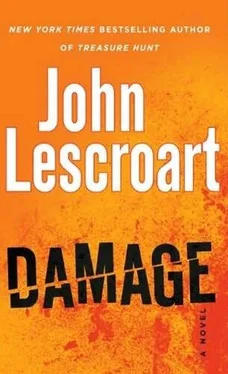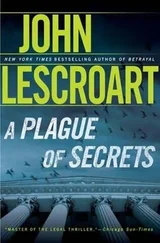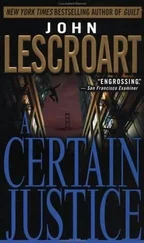“You’ve got to be kidding me,” Eztli said. “Given everything, that is just too perfect.”
“I know it is. You couldn’t have made it up any better. But it doesn’t really matter what she does. The point is that Sheila has talked to some of her sources at the Hall of Justice and she tells me that Farrell’s going ahead with some more legal shenanigans, now with the grand jury, that he thinks will wind up getting Ro back in jail and without any possibility of bail.”
“How many times can they keep putting us through this?”
“Evidently as often as they want.”
“So how would you like me to handle it?”
“Well, the idea is that we want to get the message to Farrell, but we don’t want anything that he can point to as even a remote personal threat, the way Glitsky did. The way they’re all charged up down there at the Hall, Sheila says, one of them stubs their toe, they’re going to try to connect it to Ro and get him back downtown. I think what we’ve got to do is make Farrell see that it’s in his best interest to just back the fuck off, give up on the grand jury nonsense, use his brain.”
“And you think this woman is how we get to him?”
“I don’t think we want to have her be hurt, Ez. I don’t think that would accomplish anything, other than get ’em all more rabid down there. But I’m thinking, maybe some damage at the place she works, nothing serious, but so that Farrell can’t help but get the message. I’ll leave it to your discretion.”
“And what’s the time frame?”
“Whatever’s comfortable for you. Do what you do, get your plan together. Next couple or three days, maybe, but it’s flexible.”

Glitsky was talking to Bob Grassilli in Missing Persons. Outside Bob’s window, the day had grown blustery again, and inside the small office the whistle of the wind reverberated with an insistent regularity. Grassilli was a career desk cop in his midforties, balding, and a good forty pounds over his ideal fighting trim. He smiled easily under his reddish brush of a mustache.
“I don’t even know if this is where I’d look, Abe. Eight or nine years is a pretty cold trail. You’ve tried all the usual databases, I’m assuming.”
Glitsky nodded. “Driver’s license, Social, immigration, you name it. I’ve been on it for a couple of hours already. So now I’m thinking what if she got married and changed her name?”
“She’d still have her same driver’s license number. And passport, I’m assuming. You say she’s legal?”
“She came up from Guatemala on a work visa. That was still in effect when she went into witness protection. Afterward, I don’t know.”
“Did she become a citizen?”
“Again. Don’t know.”
“Well, if she did, there’ll be a record of that someplace. Which of course is worthless if she later changed her name. But did you ever think maybe she just went back home? She’s a crime victim here, right? Maybe she just doesn’t want to be here anymore.”
“I think that’s likely, tell you the truth, Bob. But how do I find one particular Gonzalvez in Guatemala? It’s like locating a Smith here.”
“Well, welcome to Missing Persons,” Grassilli said with his trademark smile. “If anybody really wants to disappear and stay disappeared, it’s not rocket science. Unless, hey, you might consider hiring a private eye. They’ve got databases they can buy or download that we’re not allowed to use. ’Course, they’re not allowed to use them, either, but out in the private sector, no one’s checking.”
“That’s really swell news, Bob. Heartening, in fact.”
Grassilli shrugged, showing some teeth under the mustache. “I’m just the messenger, Abe. That’s the way it is.”
“Yeah, well, I don’t have enough budget for my own men. How am I going to even try to justify hiring a PI?”
“I’d say you’re probably not.”
“I’d say you’re probably right.”
OUR TOWN
By Sheila Marrenas
The tendency of the San Francisco Police Department to overreact, harass, and brutalize the citizens of our town has been well-documented over the years in this column. Mayor Leland Crawford’s appointment of Vi Lapeer, an African American woman, as chief of police raised hopes that these practices would not be tolerated any longer under his administration. These hopes were for the most part dashed over the past couple of weeks, most notably in the police treatment of Ro Curtlee, the son of this newspaper’s publishers.
As readers of this column already know, Mr. Curtlee was recently released from prison by the Ninth Circuit Court of Appeal. Then, here in the city, Judge Sam Baretto ordered Mr. Curtlee freed on bail while awaiting his retrial, a decision that did not sit well either with District Attorney Wes Farrell, or with the head of homicide, Lieutenant Abe Glitsky. Within days of Mr. Curtlee’s release, Glitsky presented a new set of spurious charges against him and, in a widely publicized incident, arrested him after first beating him seriously enough that he required hospitalization.
And again, a superior court judge-Erin Donahoe-ruled that Mr. Curtlee posed no danger to the community. She again released him on bail.
But in our town, it doesn’t seem as though the regular workings and procedures of the criminal justice system apply once prosecutors and police, even contrary to judges’ rulings, have preconceived notions about a person’s guilt. And this is why, yesterday morning, Mr. Curtlee again found himself facing yet another bit of gratuitous harassment from the police, an interrogation-fortunately this one did not turn violent-for the murder last Friday of a woman named Janice Durbin. This interrogation, in which Mr. Curtlee voluntarily and cooperatively participated, unearthed a solid alibi for Mr. Curtlee for the time of the murder. Beyond that, the inspector who conducted the interview, Darrel Bracco, told this reporter that there was no evidence implicating Mr. Curtlee in the crime. Hearing this, one might be tempted to ask, as this reporter was: “Well, then, if there is no evidence, upon what criteria did you decide to interrogate Mr. Curtlee? How could this be viewed as anything but harassment?”
In reply, Inspector Bracco had no comment.
However, police have determined that Mrs. Durbin was in fact a murder victim. Since someone did kill her, and Mr. Curtlee has demonstrated that it could not have been him, why are the police still fixated on his possible involvement? Might not the solution to this mystery, as it most always does, lie closer to home, among Mrs. Durbin’s intimates? A cursory investigation by this reporter has already determined that Mrs. Durbin’s husband, Michael Durbin, for example, cannot account for his whereabouts at the time of his wife’s death. Moreover, sources at his place of business told this reporter that Mr. Durbin may be romantically involved with another of his employees.
This is specifically not to accuse Mr. Durbin of any wrongdoing, but merely to indicate possibilities in the murder investigation that, to date, the police seem to be willfully ignoring as Glitsky and Farrell continue their personal and extralegal vendetta against Ro Curtlee.

“You’ve got to sue her,” Chuck Novio said. “Her and her newspaper and the Curtlees personally. This is the most appalling libel I’ve ever read.”
It was a few minutes after seven A.M. and they were all sitting around the dining room table, Michael and Chuck and the three Durbin children. Kathy and the twins were in the adjoining kitchen making eggs and bacon and toast. They would be cremating Janice today at eleven o’clock and so the kids and Chuck were all taking the day off from school. Durbin’s second son, Peter, had been the first one up and hence the first to read the article, and he’d barely gotten through it before he went running up the stairs to wake his father and show it to him.
Читать дальше














